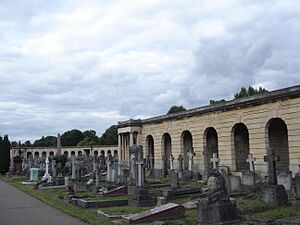Magnificent Seven cemeteries facts for kids
The Magnificent Seven is a special name for seven large private cemeteries in London. These are Kensal Green Cemetery, West Norwood Cemetery, Highgate Cemetery, Abney Park Cemetery, Brompton Cemetery, Nunhead Cemetery, and Tower Hamlets Cemetery. They were built in the 1800s because London's population was growing fast. The old churchyards were getting too full. In 1981, a historian named Hugh Meller gave them this nickname, inspired by the 1960 western movie of the same name.
Contents
History of London's Cemeteries
Why New Cemeteries Were Needed
For many hundreds of years, most people in London were buried in small churchyards. These places became very crowded and unhealthy. Important architects like Sir Christopher Wren wanted new cemeteries built outside the city. However, it wasn't until people visited Paris and saw its famous Père Lachaise cemetery that serious efforts began in London. The first of these new cemeteries was Kensal Green.
In the first 50 years of the 1800s, London's population more than doubled. It went from 1 million to 2.3 million people. The overcrowded graveyards caused big problems. Decaying bodies sometimes got into the water supply, leading to serious epidemics (widespread diseases). There were even stories of new graves being dug where bodies already lay. Sometimes, rats from the city's dirty rivers, which were used as sewers, would get into the churchyards.
How the Cemeteries Were Built
In 1832, the British Parliament passed a new law. This law encouraged private companies to build cemeteries outside central London. Over the next ten years, seven large cemeteries were created. At least four of them were officially opened by Charles James Blomfield, who was the Bishop of London.
Later, in 1852, another law called the Burial Act 1852 was passed. This law made sure that new burial grounds in London had to be approved by the government. It also allowed the government to close old, crowded churchyards. This law helped make sure burials were done properly and safely. To pay for these changes, money came from local taxes.
After these new cemeteries opened, it became popular for people to visit them. Because they were located outside the busy city, some people even had picnics among the graves.
The Magnificent Seven Cemeteries
| Name | Year opened | Location | London borough | Postal area | Active | Notes | "Friends" |
|---|---|---|---|---|---|---|---|
| Kensal Green Cemetery |
|
51°31′43″N 0°13′27″W / 51.5286°N 0.2241°W | Royal Borough of Kensington and Chelsea |
|
Yes | This is the oldest of the Magnificent Seven cemeteries. It is still in use today. |
|
| West Norwood Cemetery |
|
51°25′59″N 0°05′55″W / 51.4330°N 0.0986°W | London Borough of Lambeth |
|
Partially | This was the first cemetery in the world to use the Gothic architectural style. |
|
| Highgate Cemetery |
1860 (East) |
51°34′01″N 0°08′49″W / 51.567°N 0.147°W | London Borough of Camden |
|
Yes | This cemetery is split into two parts: the East and West cemeteries. |
|
| Abney Park Cemetery |
|
51°33′54″N 0°04′41″W / 51.5649°N 0.0781°W | London Borough of Hackney |
|
Yes | It became the main burial place for English nonconformists after Bunhill Fields closed. |
|
| Brompton Cemetery |
|
51°29′06″N 0°11′27″W / 51.4849°N 0.1908°W | Royal Borough of Kensington and Chelsea |
|
Yes | This cemetery is owned by the Crown and managed by The Royal Parks. |
|
| Nunhead Cemetery |
|
51°27′51″N 0°03′11″W / 51.4642°N 0.0530°W | London Borough of Southwark |
|
Yes | It was first known as "All Saints' Cemetery". |
|
| Tower Hamlets Cemetery |
|
51°31′25″N 0°01′49″W / 51.5237°N 0.0304°W | London Borough of Tower Hamlets |
|
No | Also called Bow Cemetery, it stopped new burials in 1966. It is now a local nature reserve. |
|
See also
 In Spanish: Siete Magníficos para niños
In Spanish: Siete Magníficos para niños
 | William M. Jackson |
 | Juan E. Gilbert |
 | Neil deGrasse Tyson |


